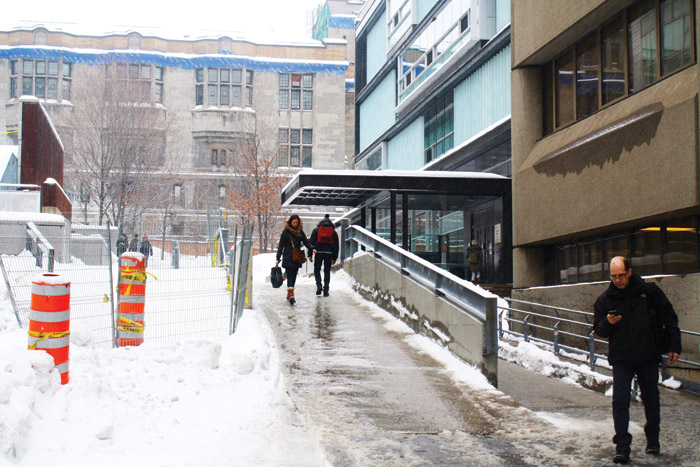The Office for Students with Disabilities (OSD) and the Senate Subcommittee on Persons with Disabilities are joining efforts to promote wider accessibility on the McGill campus, pushing for universal design as well as more education around the topics of mental health and impacts of stereotypes.
Arts Senator and member of the Subcommittee on Persons with Disabilities Kareem Ibrahim spoke on the need for universal design, which would conceptualize accessible structures from the onset of planning. This could allow people with disabilities to have the same experience as anyone else in terms of obtaining resources and services.
“Whether it’s accommodating students with different learning styles, learning disabilities, or physical disabilities—it’s making it so that the spaces in which we live and work and the services that we provide are accessible to everyone without students having to request additional accommodation,” Ibrahim said.
Although there is little disagreement over the merit of universal design, Ibrahim explained that budget constraints are an obstacle that the subcommittee is working to overcome.
“I’ll be spearheading an application to the Sustainability Projects Fund in order to bring universal design elements into the classroom,” he said. “We want to show the administration that this isn’t just a fruitless endeavour; it has a lot of worth to students.”
The OSD is also collaborating with Student Housing and Hospitality Services (SHHS) on an ongoing project to identify accessibility barriers in McGill residences. Cameron Butler, a recent McGill graduate, and Xindi Li, U3 Arts student, developed an audit template through which they assessed the McGill residences, interviewed SHHS staff, and consulted student focus groups.
“We ended up breaking the project down into three main areas: The first being the physical buildings themselves, the second being the programming and events that happen in rez, and the third being communication.” Butler said.
Their findings revealed limitations to both physical and mental accessibility in all three areas of the audit. According to Butler, insufficient colour contrast between walls and floors, unclear signage, a shortage in accessible washrooms, and inaccessible entryways were the major issues that posed problems for navigating the physical spaces of residences.
Regarding programming and events such as Rez Fest, Butler mentioned another set of challenges.
“[Barriers] to Rez Fest [include] its placement at the top of the hill, its loud, active nature, and its requirement of lots of physical activity and an outgoing personality,” Butler said. “Students in the focus group voiced that it was difficult to participate when they were experiencing social anxiety.”
Butler then offered some recommendations to make Rez Fest a more inclusive activity.
“Events should be more balanced to allow better accessibility—if there’s a major drinking event one night, there should be a quieter event that follows,” he said.
As for interactions between students and staff, one concern was a lack of comfort around language that describes disabilities.
“[It] was clear that there’s a strong desire to be furthering initiatives around disability, but there was hesitancy when it came to finding the right words.” Butler explained. “There would be a pause between saying ‘disabled student’ or ‘student with disabilities’ and not knowing which one to use or why.”
In the upcoming months, this project will be handed over to a working group, which will be briefed on Butler and Li’s findings and seek to begin implementing changes. Butler acknowledged that although several successes have been achieved regarding accessibility—such as Mental Health Awareness Week and the creation of an online Accessibility Hub—long-term developments require time.
“The plan is to formally start the working group, meet with them and go through report, flesh out the recommendations, and build a finalized plan for how they will be institutionalized within SHHS,” Butler said. “We want to make sure that once our work finishes in April, all our momentum will be carried forward.”









